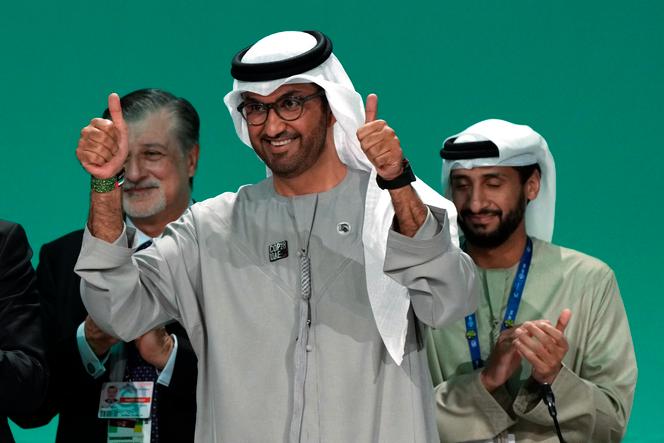


The COP was in a precarious position on Monday, December 11. The 28th World Climate Conference (COP28) was presided over by Sultan al-Jaber, who had been holding the pen alongside his teams since the previous day. Having listened to all parties, he had the onerous task of drafting a text that brought everyone to an agreement. Pressure mounted. Over the past 10 days, the most ambitious among them had been pushing for fossil fuels to be phased out. However, the Organization of Petroleum Exporting Countries (OPEC) sensed the danger and issued a statement calling for no compromise.
During the majlis on December 10 – the Arabic name for traditional meetings – al-Jaber heard Iraq and Saudi Arabia dismiss the very idea of abandoning fossil fuels. He also heard dozens of delegations describe the urgency of action in the face of climate disruptions that are becoming increasingly tangible.
Ultimately, the text published on Monday appeared to be guided by the interests of hydrocarbon producers. States were simply "invited" to "reduce" fossil fuel consumption and production. Just 24 hours remained before the COP officially closed. There was immediate rebellion: the European Union, the United States, Australia, and the small island states all condemned the draft text as "unacceptable."
Is it true that al-Jaber considered this text to be balanced, as several sources claimed? Or, was this a deliberate strategy? Arnaud Gilles, the climate and energy manager at the World Wildlife Fund (WWF), said, "Perhaps it was necessary for this draft to be put on the table, and the very unfavorable response it received helped the president to show the other producer countries that such an agreement wouldn't pass."
The Emirati president of the climate conference corrected the record two days later. On Wednesday, December 13, an agreement was finally reached after many lengthy negotiations. Even though it's imperfect and flawed, observers agree that it signals "the beginning of the end" for the coal, oil, and gas era. The text particularly calls for "a transitioning away from fossil fuels in energy systems (...) to achieve net zero by 2050," with "an acceleration" over the course of this decade. According to al-Jaber, was hotly contested since he was appointed COP head, the decision is "historic."
"The Emirates took on this presidency to demonstrate their know-how in terms of international diplomacy, and they succeeded. They achieved an agreement that isn't the lowest common denominator," said French Minister for Energy Transition Agnès Pannier-Runacher, praising the personal role played by al-Jaber. "They pushed certain states to cross their red line. This is an example of a successful presidency."
You have 60% of this article left to read. The rest is for subscribers only.
